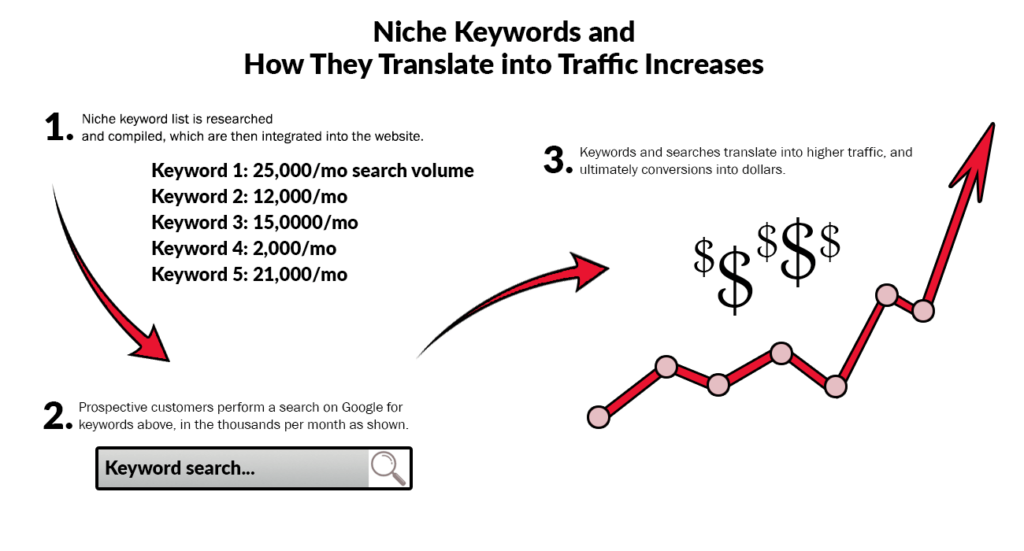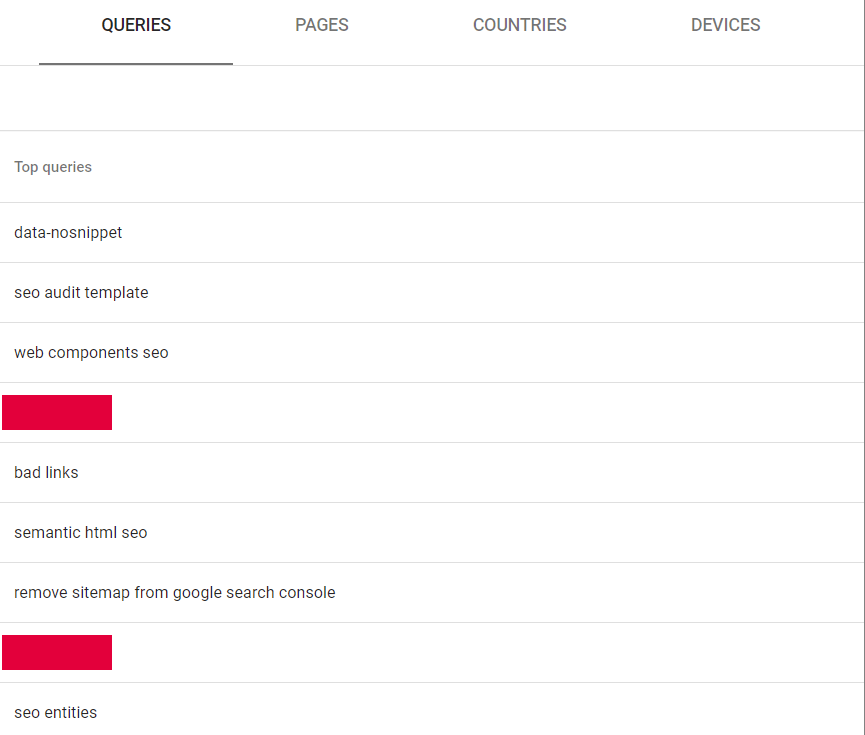Why are you looking to find niche keywords? Do you want to find those keywords that will help you dominate Google rankings? Or are you looking for these types of keywords so you can optimize your content properly?
There are many reasons why you might want to find niche keywords. Maybe you want to make extra money online, or maybe you just want to learn how to rank higher on Google. Whatever your reason, you should always look for these types of keywords that will help your website get found.
We have put together a process to mine keyword ideas that you can use to build websites that earn passive income. The process to unearth such keywords is perfect for beginners who are new to internet marketing. The process also works great for experienced marketers who want to expand their traffic and revenue streams.
What Are Niche Keywords?
Niche keywords are very specific terms used to describe products or services within a certain industry or category. They are extremely useful for driving targeted traffic to your site. For example, you could use the keyword “dog grooming” to target people searching for dog groomers in Los Angeles.
The problem with niche keywords is that they typically have low search volumes. You might see 10 searches per month for the term “dog grooming,” compared to millions of searches for “pet care” or “dogs.”
However, they do generate high quality traffic. People looking for dog grooming services in LA might be interested in learning about your business, so it makes sense to invest in these keywords.
But, when you do the correct keyword research, it’s possible to achieve higher search volumes by targeting broader keywords with a higher volume.
What Are Examples of Niche Keywords?
We want to see niche keywords that have a healthy search volume. Search volume is an indicator that consumers are searching for that keyword, which means that you will find many more results than otherwise.
For example, something like “gaming laptops” has a 1.2 million level search volume. This would fit the definition of a niche as well, because gaming laptops is all its own with many potential consumers. It has a popular product, along with something that you could write mountains of content about.
Here is another example: say that you are working on a site that sells nothing but computer monitors. Although not typically the case, this could be another individual micro-niche. With a healthy search volume of 287,000 per month, this has sustainable search volume as well as a marketable premise.
Where Do You Use Niche Keywords?
These types of niche keywords are important because they allow you to target specific audiences within your industry. They’re often less competitive and easier to rank for, making it possible to gain visibility quickly. You can choose to focus on one type of product or service, such as “commercial cleaning,” or you could go broader and try to cover multiple areas, like “cleaning.”
The key is finding the right balance between broad and narrow terms. If you pick too many broad terms, you’ll end up competing against lots of different businesses. But if you stick to just a few specific terms, you won’t be able to reach everyone interested in what you offer.
For instance, if you sell commercial cleaning supplies, you could choose a keyword like “commercial cleaning supplies.” This keyword targets people searching for commercial cleaning supplies and helps you show up in search results where they’re most likely to find what they’re looking for.
You can also use these types of keywords to target specific geographic areas. If you run a restaurant, you might choose a phrase like “restaurant near me,” since it includes location information.
If you’re selling something online, you can use keywords like “online shopping cart software” or “best ecommerce platforms.” These phrases include location information, meaning you’ll be able to show ads to people who live nearby or are planning to shop online.
You want to find a sweet spot where you can still compete effectively while being able to attract the right audience. This is why we recommend starting out with a handful of targeted keywords and gradually expanding your list over time.
Why are Niche Keywords Important to Your Business?
These particular types of keywords are different from broad, popular key terms. They’re much smaller in size and scope and tend to be highly specific. When people use them, they’re usually searching for something very specific. For example, if someone searched “organic cleaning,” it’s difficult to know what they wanted to see. Maybe they just want to learn more about organic cleaning. Or maybe they want to hire an organic cleaning company.
If someone uses a broad term like “cleaning,” it’s easier to guess what they want. But if they use a narrow term like “organic cleaning,” it becomes harder to determine what they want. This makes it hard to rank well for those queries.
So how do you figure out which ones are most relevant to your business? Here are some tips.
Start with the questions you ask yourself every day.
Ask customers what they want to buy, what problems they face, and what they don’t understand.
Use tools like Buzzsumo and Keyword Explorer to help you identify trends and niches within your industry.
Look up similar businesses to yours to see what keywords they’re targeting.
Broader keywords can lead to more ambiguity in your searches. If someone searches “organic,” it’s difficult to know what type of organic cleaning they’re interested in. Is it chemical free? Does it use natural ingredients? What is the difference between chemical free and green cleaning?
These questions lead us to believe that someone searching for organic cleaning might be looking for more information about the subject. This makes it easier to target ads to those individuals.
By targeting these keywords, you increase the possibility of ranking for them while lowering your competitive risk.
The following is a screenshot of a list of keywords within Google Search Console. In your own GSC, to the right you will normally see clicks, impressions, average CTR, and average positions of your page within the SERPs (when enabled).
Niche Keywords: How to Find the Best Keywords
If you want to find profitable keywords for your niche, it helps to know what types of words people use to describe products and services within your industry.
Once you’ve found some keywords, you’ll want to make sure that they aren’t already being targeted by someone else. To check whether or not a particular keyword is taken, we recommend using the Google AdWords Keyword Planner.
For example, the Keyword Planner lets you input multiple keywords and compare the number of monthly searches each one receives. If there are lots of competitors targeting a certain term, it might be worth considering another phrase.
Your keyword list has to be a specific list tailored to your website, and specific to you, as well as to your overall business. These keywords are only valuable where relevance to you is concerned, and you don’t have to utilize every possible variation of every recommendation. However, you do have to know about them. Some of these variations may show differences in purchasing behaviors, or other patterns that can be utilized to learn more about your industry. This is especially true if you adopt some of these methodologies for paid advertising like Facebook ads.
As you build up your authority over time, it will become easier to rank for the more challenging keyword phrases.
Define Your Niche
Before you start conducting keyword research, it’s important to define that topic area. This is where you’ll find out what type of products or services you offer. For instance, if you sell organic cleaning supplies, you’d likely want to target “organic cleaners.” But if you sell a variety of different products, such as cleaning supplies, home decor items, etc., you might want to narrow down your focus to one specific product category.
Determine if customers are searching for things: Once you’ve defined it, you will want to determine whether your customers are searching for information about your niche or products within it. If most people are looking for information about it, you’ll probably want to use a keyword like your primary industry keyword as your primary keyword phrase. On the other hand, if most people are looking for products within it, you’ll likely want to use those terms as secondary keywords.
Identify your audience: Now that you know all about your area, you’ll need to figure out who your ideal customer is. Who are they? What are they like? How much money do they make? Where do they live? Are they male, female, or another? Do they work full-time or part-time? These questions help you understand who your audience is and what makes them tick.
Discover your competition: You don’t want to compete against yourself. Instead, you want to find companies that are already doing well. They’re likely to be successful because they’re providing something that people want. By identifying your competitors, you’ll learn what types of products or services they offer, how they market themselves, and how they communicate with their audiences. However, you don’t want to go after super competitive keywords right off the bat. You’re not going to have authority at the beginning of a new site, so you have to build that authority first. After you’ve built up enough authority, you can then move forward with trying to rank for the harder keywords.
It helps to identify your competitors, and to do this we also recommend using a free keyword research tool like the Google Keyword Tool (such as Google’s Keyword Planner) or Keywords Everywhere.
Use a Keyword Research Tool to Find Niche Keywords
Before you start building your site, you’ll want to make sure you’re choosing niche keywords that people actually care about. You might think that everyone wants to buy organic food, but that isn’t necessarily true. If you look closely at the organic food market, you’ll see that there are many different types of consumers out there.
You’ll want to find a niche that interests you, but one that isn’t too saturated. For example, you might not be interested in buying organic dog food because there are already too many sites selling organic dog food. Instead, you will want to focus your efforts on finding ways to improve the health of dogs without resorting to traditional medicine.
To do this, you’ll need to use a tool called a keyword research tool. These tools allow you to enter a list of words related to your topics and return a list of keywords that are most likely to bring visitors to your site.
The best way to learn about specific niche keywords is to perform a quick search yourself. Type in a few key phrases into Google and see what pops up. This will give you some idea of whether your chosen area is competitive enough to support your efforts.
Once you’ve identified a handful of keywords, you’ll need to decide which ones to pursue further. There are several factors to consider here. First, you’ll want to determine whether those keywords are relatively easy to rank for. Second, you’ll want to check whether those keywords tend to produce high volumes of searches per month. Finally, you’ll want to take a look at the competition for each term.
If you find that a given keyword produces low volumes of searches monthly, but doesn’t seem to have a lot of competition, you might still want to go ahead and add that keyword to your list. However, if you find that a given term does have a lot of competition and produces little volume, you’ll probably want to move on to another option.
The key with keyword research is to prioritize the keywords on your list that have relevance to your niche, as well as low search volume and lower competition, so they are easier to rank for and so you can gain authority. As you continue gaining authority, you can then go after the more competitive keyword phrases.
We recommend reading our free keyword research tools guide if you want to find free tools that can help you with this task.
Analyze Your Keyword List
Once you’ve compiled a list of keywords, it’s time to determine which ones to focus on. There are three things you need to consider when prioritizing your keywords: relevance, competition, and conversion.
Relevance refers to whether or not the keywords you choose are actually related to your product or service. For example, if you sell shoes online, you might target “buy men’s dress shoes.” This keyword isn’t very specific because it doesn’t tell searchers exactly what type of shoe they’re looking for. Instead, you’d want to include words like “brown,” “black,” and “menswear.” These keywords are much more specific and will help you rank better for queries like “men’s brown dress shoes.”
Competition refers to how many sites are already competing for those keywords. In our previous example, we could add “dress shoes” to increase our chances of ranking well for that phrase. However, adding too many variations of the same keyword can hurt your rankings, so make sure you pick keywords that aren’t already being used heavily by others.
Conversion refers to how likely someone searching for that particular keyword is to buy something, once they arrive on your site. For example, if your goal is to earn money online, you might target keywords like “make money online” or “how to make money online.” These keywords are more focused and will lead searchers directly to products or services that relate to earning money online.
By making sure that your list contains a broad distribution of keywords focused on relevance, competition, and conversion, you can create a keyword list that will help you continue to earn a profit for your business.
Refine Your Niche Keyword List
A list of keywords has no intrinsic value; it’s simply a suggestion. But like anything else, there’s a difference between having a good idea and actually executing it. If you want to make sure that you’re getting the most out of your list, here are some tips to help you refine it.
Find a niche.
The best way to narrow down your list is to focus on one particular area of expertise. You might think about where you work, what you sell, or even how you spend your free time. Whatever you choose, make sure it’s something that people care about.
Use the right tools.
WordStream offers a number of different tools to help you identify the perfect keywords for your business. There are other keyword research tools available. If you want to take a look at a few tools you can use to accomplish niche keyword research for free, be sure to read our free keyword research tools guide.
Add URLs.
If you already have a blog or website, you can use a tool like Semrush to see how your site’s optimized for existing keywords. If you use a tool like Google Search Console, this tool allows you to see which URLs on your site are getting traffic for a certain keyword.
Determine How Competitive Your Niche Keyword Phrases Are
The next step is determining how competitive each keyword phrase actually is. If you’re just starting out, this might seem like a daunting task.
First, let’s take a look at what competition looks like in general. In the example above, the blue bars represent the number of competing sites for “best dog food.”
Now, let’s focus on one particular term: “dog food.” We’ll start by looking at the number of competing sites, followed by the percentage of those sites that rank organically for that term.
Next, we’ll examine the average position of the top 10 rankings. This tells us whether the term is highly competitive or not.
Finally, we’ll check to see whether the site that ranks #1 is optimized for the term. A high score here indicates that the site is likely to perform well for the term.
Once you’ve completed this exercise, you’ll know more about how to get your site to the number one position for your keyword phrase.
Monitor and Adapt Your Niche Keywords as Needed
Once you have the right niche keywords and integrate them into your site, your work continues. It’s vital that you constantly monitor your keywords and their effectiveness. This way, you’ll know what works best for your business, and you can also make any necessary changes accordingly.
When you add niche keywords to your marketing strategy, you need to monitor those keywords’ performance for a few months; otherwise, you might miss out on some opportunities. For example, if you’re trying to rank for a specific keyword, but you don’t see much movement, it could mean that there are too many sites competing for that term. In such cases, you may want to try different strategies to increase visibility.
If you’ve been monitoring a particular page for a few months and it hasn’t ranked well, you may need additional link building or need to optimize the page content to better suit search results. If you notice that one of your pages isn’t performing well, check the analytics to find out why. Maybe it’s because you haven’t optimized the page properly, or maybe it’s because someone else has already built links to that page. Either way, you’ll need to fix the problem so that you continue seeing improvement in your rankings.
Niche Keywords Aren’t Be-all, End-all, but They Can Improve Your SEO Results
By concentrating on a straightforward and easy to use process, it’s possible to create profitable keyword lists for any niche.
As you continue to work through the niche keyword research methodology for your sites, you will get better. You will also learn how to spot profitable niche keywords almost instantaneously.
Don’t worry if you don’t get things perfect the first or second time around. Like anything else, becoming successful at this process takes practice!
When do you plan on starting your next niche website and doing keyword research to support it?














